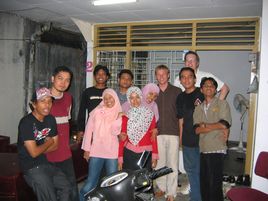Training and advanced training

Sub-component 6100
The objective of sub-component 6100 was to strengthen and establish individual capacities in the region of the Indian Ocean. The primary focus was on a scientific and technical experts were reinforced.
Academic training
The academic training envisages a guest scientist programme (PostDoc), as well as a graduate college (PhD). While each guest scientist in the PostDoc programme conducted research for a brief time (2-6 months) at one of the relevant German research institutes, the doctorate programme ran over a total of three years, including a degree at a German university.
The PostDoc/guest scientist programme within the contact of the training and advanced training measures made it possible for already-established scientists to have a brief stay in Germany, in order to conduct research projects together with the respective German partner institution. During the stay in Germany, each guest scientist was offered the opportunity to participate in advanced training events. The United Nations University-UNU-EHS offered supplementary technical seminars and short workshops on the subjects of "disaster management" and "vulnerability assessment".
The PhD programme enabled junior scientists to with a Master of Science degree in one of the relevant research institutes, to have a long-term stay in Germany. A doctorate topic was conducted with the respective German partner institution (components 1000-5000) and submitted as a doctorate thesis to a German university. The Graduates College was basically set up as a sandwich programme and envisaged that the doctorate student would spend 6-8 weeks per year communicating his/her gained findings and research results in his/her institution at home and equally contributing to the further development and establishment of the TEWS. The aim of this was to interlink research work and thus the sustainable development of the tsunami early warning system.